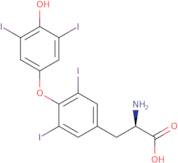Informations sur le produit
- (R)-2-Amino-3-(4-(4-hydroxy-3,5-diiodophenoxy)-3,5-diiodophenyl)propanoicacid
- 3,3',5,5'-Tetraiodo-D-thyronine
- 3,3′,5,5′-Tetraiodo-<span class="text-smallcaps">D</span>-thyronine
- <span class="text-smallcaps">D</span>-T<sub>4</sub>
- <span class="text-smallcaps">D</span>-Thyroxine
- <span class="text-smallcaps">D</span>-Tyrosine, O-(4-hydroxy-3,5-diiodophenyl)-3,5-diiodo-
- D-4-(4-Hydroxy-3,5-diiodphenoxy)-3,5-diiodbenzylalanin
- D-4-(4-hidroxi-3,5-diiodofenoxi)-3,5-diiodobencilalanina
- D-4-(4-hydroxy-3,5-diiodophenoxy)-3,5-diiodobenzylalanine
- D-T4
- Voir d'autres synonymes
- D-Tyrosine, O-(4-hydroxy-3,5-diiodophenyl)-3,5-diiodo-
- D-thyroxine free acid
- Dextrothyroxine
- O-(4-Hydroxy-3,5-diiodophenyl)-3,5-diiodo-<span class="text-smallcaps">D</span>-tyrosine
- O-(4-hydroxy-3,5-diiodophenyl)-3,5-diiodo-D-tyrosine
- O-(4-hydroxy-3,5-diiodophenyl)-3,5-diiodotyrosine
- Thyroxine, <span class="text-smallcaps">D</span>-
- Thyroxine, D-
D-Thyroxine is a thyroid hormone that promotes growth and regulates metabolism. It is an important medication for the treatment of hypothyroidism and goiter. The activity of D-thyroxine is similar to that of levothyroxine, but there are differences in its pharmacology. D-Thyroxine has been shown to have a lower receptor activity than levothyroxine, which may be due to its inability to bind to the thyroid hormone receptor. D-Thyroxine also does not induce insulin secretion, so it can be used in diabetic patients without fear of drug interactions with other oral antidiabetic medications. Neutral pH preparations are available for intravenous administration, which makes this drug suitable for long-term use.





